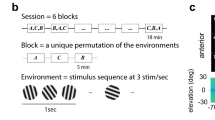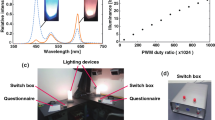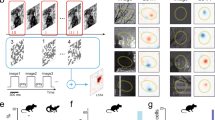Abstract
THE problem of expediting artificially the adaptation of the eye to darkness is of considerable theoretical, and of no less practical importance, as, for example, in the case of night flying under war conditions. It has long been established that the period of adaptation when passing into complete darkness from a brilliantly lighted room is 45–50 minutes, and from a dully lighted room 25–30 minutes.
This is a preview of subscription content, access via your institution
Access options
Subscribe to this journal
Receive 51 print issues and online access
$199.00 per year
only $3.90 per issue
Buy this article
- Purchase on Springer Link
- Instant access to full article PDF
Prices may be subject to local taxes which are calculated during checkout
Similar content being viewed by others
References
Bull. Exp. Biol. Med. (1937).
Author information
Authors and Affiliations
Rights and permissions
About this article
Cite this article
KEKCHEYEV, K. Expediting Visual Adaptation to Darkness. Nature 151, 617–618 (1943). https://doi.org/10.1038/151617b0
Issue Date:
DOI: https://doi.org/10.1038/151617b0
This article is cited by
-
Effect of Ephedrine on Dark Vision
Nature (1954)
Comments
By submitting a comment you agree to abide by our Terms and Community Guidelines. If you find something abusive or that does not comply with our terms or guidelines please flag it as inappropriate.



